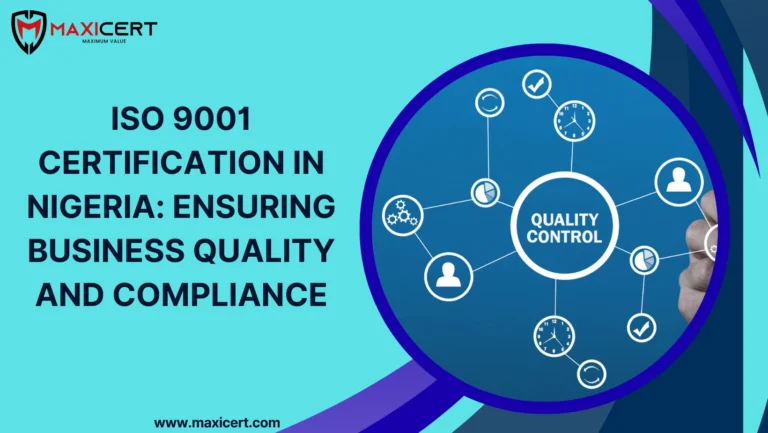ISO 9001 Certification in Nigeria: Ensuring Business Quality and Compliance

Introduction
With the deepening of Nigeria’s economy, there is a surge in the demand for product and service excellence. Be it a manufacturing industry, a service providing firm, or a government contractor, compliance with international standards has the potential to differentiate your firm. This is the exact reason where ISO 9001 certification is extremely useful.
ISO 9001 is the most popular Standard for Quality Management Systems (QMS) in the world. For Nigerian companies, embracing ISO 9001 brings operational improvement, enhanced customer confidence, and increased business competitiveness on the domestic and international stage. In this post, we will discuss the relevance of ISO 9001 certification in Nigeria, the certification process, and its importance for Nigerian companies.
What is ISO 9001 Certification?
ISO 9001 is a standard of the International Organization for Standardization (ISO) of which its main concern is setting the requirements for the Quality Management System (QMS) of a particular institution.
Important pointers are:
- Managing the processes mathematically.
- Ensuring that the products and services are quality and issued consistently.
- Give utmost importance to the institution’s customers and have a positive and progressive attitude towards change.
- It is in line with international standards and norms of doing business.
Achieving these standards enables organizations in Nigeria to show that they have the necessary processes in place to meet regulatory and customer needs for certification.
Request A Free Quote
Why Is ISO 9001 Certification Important in Nigeria
Every business in Nigeria has to operate within a limited competitive market while simultaneously proving reputation to clients and business associates. ISO 9001 aids in:
- Gaining customer’s trust – Proves business requirements have been met.
- Acquiring contracts – ISO certification is a requirement for many international and government contracts.
- Increasing efficiency – Reduction in waste, errors, and redundant processes.
- Brand reputation improvement – Emergence as a trusted mark at a national and international level.
In industries such as manufacturing, healthcare, oil and gas, ICT, and education, the differentiating strength of ISO 9001 certification is becoming evident.
Advantages of ISO 9001 for Companies in Nigeria
Customer Satisfaction
- Enhanced and more responsive to clients.
- Improved and dependable product/service delivery.
Compliance with Regulations
- Better integration and alignment with Nigerian regulations.
- Facilitates exports and international business trade.
Business Operations Profitability
- Improved effectiveness with reduced waste and errors.
- Standardized documentation and monitoring of processes.
Business Industry Standing
- Improved access to larger contracts and international markets.
- Higher trustworthiness while competing with international brands.
Industries in Nigeria that Enjoy Most the Benefits of ISO 9001
While ISO 9001 is beneficial for all organizations, its impact is deeper in the following sectors:
- Manufacturing – Supports the uniformity of production and quality assurance processes.
- Healthcare & Pharmaceuticals – Provides better patient safety and confidence in medical products.
- Oil & Gas – Improves compliance and risk management as well as trust from stakeholders.
- Education – Improves supervision of the academic and administrative functions of the institution.
- Construction – Improves the project planning, execution, and delivery.
How to Get ISO 9001 Certification in Nigeria
Following a well-defined sequence of steps will lead to attaining ISO 9001 certification:
Step 1: Gap Analysis
- Evaluate the existing processes with ISO 9001 standards.
Step 2: Documentation
- Formulate the relevant policies and procedures and formulate records for the QMS.
Step 3: Training & Implementation
- Training on quality procedures is delivered to the employees.
- New processes are used in everyday work.
Step 4: Internal Audit
- Evaluate the compliance and the overall preparedness through audits.
Step 5: Certification Audit
- Adherence is checked by external auditors and subsequently confirmed.
Step 6: Certification Awarded
- The organization is awarded ISO 9001 certificate for a period of 3 years (subject to annual surveillance audits)
Common Issues and Policy Recommendations For Nigeria
- Lack of adoption – The value of ISO 9001 is not understood by many SMEs.
Solution: Provide training and consultancy as required. - Financial concerns – Certification is viewed as too costly.
Solution: Treat as an investment with substantial long-term gains (contracts, operational efficiency, and enhanced credibility). - Reluctance to adopt new processes – Employees are likely to resist new processes.
Solution: Provide training and effectively communicate the benefits to be gained.
How Long Does it Take to Attain ISO 9001 Certification in Nigeria?
- Small organizations: 3–4 months
- Medium organizations: 4–6 months
- Large organizations: 6–12 months
The timeline is different on the organization’s current preparedness, the level of managerial engagement, and the organizational resources on hand.
Conclusion
Obtaining ISO certification in Nigeria is more than being compliant; it improves your organization’s credibility, operational efficiency, and market opportunities. For businesses in Nigeria, this certification enhances access to lucrative contracts, fosters customer loyalty, and improves competitiveness in the global market.
Interested in boosting your business performance with ISO 9001 certification in Nigeria?
Reach out to Maxicert today, and our specialists will assist you in navigating the entire certification process.

Get In Touch

Get In Touch

Get In Touch
Need A Free Estimate?
Get a free consultation and Checklist to get certified for ISO , HALAL, CE Mark Certification.
FAQ
What is ISO 9001 certification?
It’s an international standard for Quality Management Systems, helping businesses deliver consistent quality.
How much does ISO 9001 certification cost in Nigeria?
Costs vary depending on business size, scope, and certification body.
Can small businesses in Nigeria get ISO 9001 certified?
Yes, ISO 9001 applies to both small and large organizations.
How long is ISO 9001 certification valid?
Certificates are valid for three years, with yearly surveillance audits.



